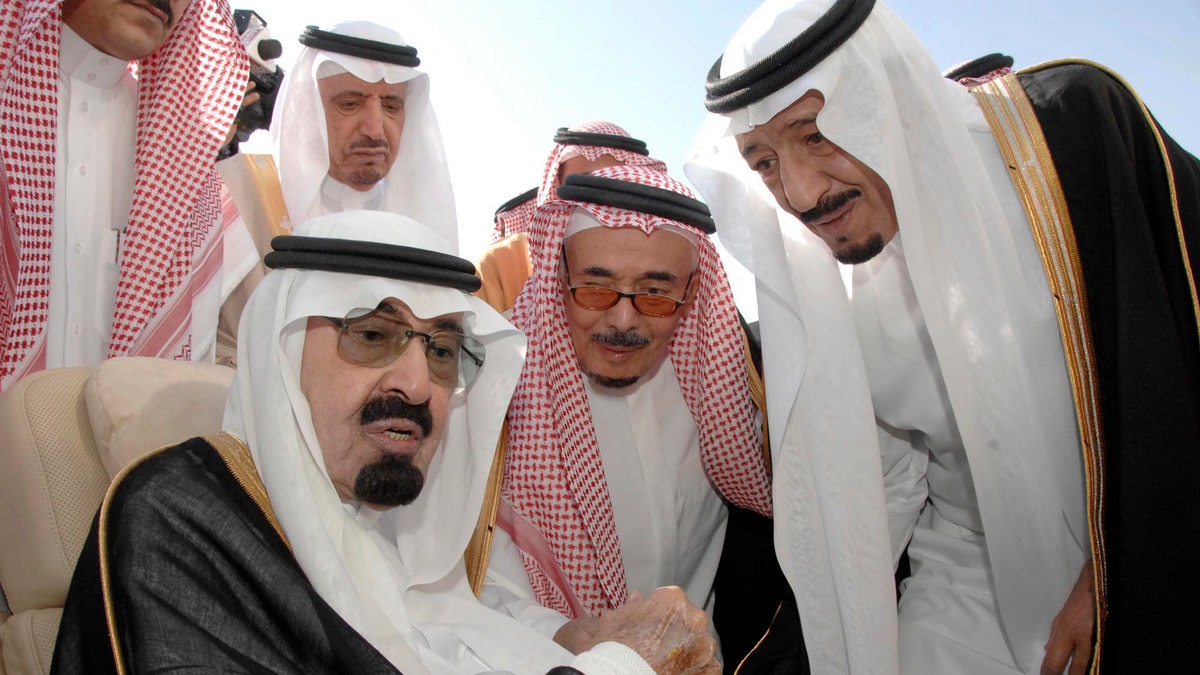
The royal family, including Saudi King Abdullah, (l.), is believed tobe concerned about homegrown jihadists. (AP)
Efforts by the West to pressure Egypt’s new government to end its crackdown on the Muslim Brotherhood could be moot thanks to Saudi Arabia’s oil money – and whole-hearted backing of the military.
While the West calls for peace in Cairo, the Saudis are supporting Gen. Abdel Fattah el-Sissi, who led the ouster of Mohammed Morsi. The Kingdom has pledged to make up for any loss in foreign aid resulting from the military’s brutal crackdown on the Muslim Brotherhood.
On Monday, the country’s foreign minister Prince Saud Al-Faisal issued a hard-hitting statement via the Saudi Press Agency pushing back on the West.
[pullquote]
“To those who have announced they are cutting their aid to Egypt, or threatening to do that, (we say that) Arab and Muslim nations are rich and will not hesitate to help Egypt,” said Saudi Foreign Minister Prince Saud Al-Faisal, in a statement to the Saudi Press Agency. “Arab states will never accept manipulation of their fates or tampering with their security and stability by the international community.”
The European Union is considering whether to halt $6 billion in aid to Egypt’s new government, and in Washington, pressure continued to mount on the Obama administration to consider further steps. Several lawmakers said Obama’s decision last week to cancel planned joint military exercises with Egypt and to delay delivery of four F-16 fighter jets doesn’t go far enough.
German Chancellor Angela Merkel on Sunday suggested halting previously approved arms shipments to Egypt as part of a coordinated European response. Her development minister today told German radio that Berlin will make “no further pledges this year” of aid to Egypt, and that Germany “won’t negotiate this year” any debt relief for the country.
Some analysts believe the Arab Spring and its aftermath is increasingly exposing an acrimonious division between the Gulf countries and the West over the future of the Middle East, one that is likely to worsen and threaten the ties linking the West and the royal families of the region.
The split between the Saudis and the West over Egypt is not only underscoring policy differences over the Muslim Brotherhood, they say, but is highlighting a growing divergence of interests between Washington and the European capitals and Riyadh when it comes to political reform in the region.
For the House of Saud, stability and security trumps reform – which could threaten the Saudi royals’ own hold on power, whether change comes in the form of democracy or Islamists.
“The Saudis remain very dubious about American policy toward the Arab awakening,” believes Bruce Riedel, a director of the Intelligence Project at the Brookings Institution, a Washington DC-based think tank.
Riedel, a former CIA analyst, argues: “They want a more robust American role in arming the rebels in Syria, support for Sissi in Egypt and unrestrained backing for the Sunni monarchy in Bahrain. Washington and Riyadh no longer share the same assessment of the threat, and that means trouble will continue in the oldest American alliance in the Middle East.”
Saudi Arabia, along with its Gulf allies the United Arab Emirates and Kuwait, has already pledged $12 billion in aid to Egypt’s new rulers – a figure that dwarfs the $1.3 billion the U.S. gives Egypt annually. Like the Saudi monarchy, the royal families of the Emirates and Kuwait are bitter foes of the Muslim Brotherhood, which they have long seen as a threat.
For them, the Arab Spring always threatened the empowering of Islamists in the region. The Saudi royals didn’t contain their fury at the toppling of Egyptian autocrat Hosni Mubarak or the fall of Tunisian dictator Zine El Abidine Ben Ali, the first of the autocrats to fall in the Arab Spring. He and his family were given sanctuary in Saudi Arabia.
While the West has welcomed the Arab Spring – although fearing its consequences – Saudi Arabia has sought to halt change as in neighboring Bahrain, where it dispatched security forces to assist in the suppression of democracy activists. Some diplomats think that the Saudi belief that Mubarak fell because the U.S. abandoned him propelled the Saudis to move quickly in Bahrain.
Elsewhere, the Saudis have tried to shape Arab Spring away from the Muslim Brotherhood as in Syria, where they have channeled aid and weapons to favored non-Islamist brigades or brigades not linked to the Muslim Brotherhood.
And while Washington labored over whether to dub the ousting of Morsi, Egypt’s first ever Islamist president, a coup or not, Riyadh didn’t disguise its delight with King Abdullah issuing a statement of support within hours. He has since continued to offer rhetorical support for what he calls Egypt's fight against “terrorism and extremism.”
